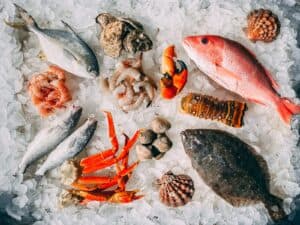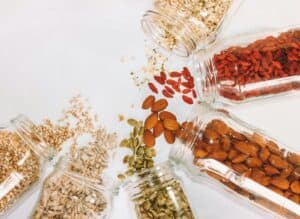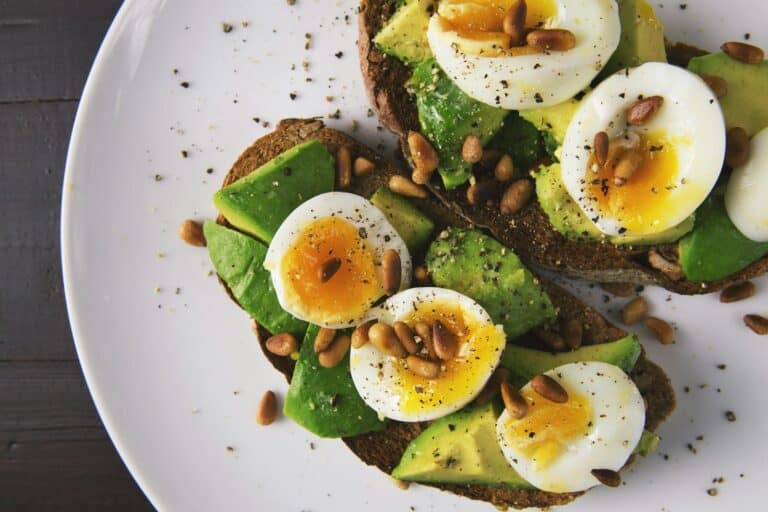Protein is an essential nutrient that is needed by the body to build and repair tissues. It is one of the three macronutrients, along with carbohydrates and fats, that are required in large quantities by the body. Protein is made up of blocks called amino acids, which are the building blocks of all proteins in the body.
Amino acids can be classified into two types: essential and non-essential. Essential amino acids are those that the body cannot produce on its own and must be obtained from food sources. Non-essential amino acids, on the other hand, can be produced by the body.
In this blog post, we will discuss foods that contain proteins, how much protein a person needs, and the benefits of including protein in your diet.
Foods that Contain Proteins
It’s important to include a variety of protein-rich foods in your diet to ensure that you are getting all the essential amino acids. Protein is an important part of a healthy diet, and it is recommended that adults consume between 0.8 and 1.2 grams of protein per kilogram of body weight per day. However, the amount of protein a person needs can vary depending on factors such as age, sex, body weight, physical activity level, and health status.
Animal-Based Proteins

Animal-based protein sources are some of the most well-known sources of protein. They include:
- Meat: Beef, pork, chicken, turkey, and other types of meat are good sources of protein. However, it is important to choose lean cuts of meat and to limit the intake of processed meat such as hot dogs, sausages, and bacon. Processed meat has been linked to an increased risk of certain types of cancer, including colorectal cancer.
- Seafood: Fish, shellfish, and other types of seafood are also good sources of protein. They are also rich in omega-3 fatty acids, which are important for heart health.
- Dairy products: Milk, cheese, and yogurt are good sources of protein, as well as other key nutrients such as calcium and vitamin D. However, they can also be high in saturated fat, so it is important to choose low-fat or fat-free versions.
- Eggs: Eggs are an excellent source of high-quality protein and contain all of the essential amino acids needed by the body.
Plant-Based Proteins

Plant-based protein sources are becoming increasingly popular, especially among those following a vegetarian or vegan diet. They include:
- Legumes: Beans, lentils, peas, and chickpeas are all good sources of protein. They are also rich in fiber and other key nutrients.
- Nuts and seeds: Almonds, peanuts, sunflower seeds, flax seeds, hemp seeds, sesame seeds, and pumpkin seeds are all good sources of protein. They are also high in healthy fats, which are important for heart health.
- Grains: Quinoa, brown rice, oats, and other whole grains are good sources of protein. They are also high in fiber and other key nutrients.
- Vegetables: Broccoli, spinach, Brussels sprouts, and other vegetables are also good sources of protein. They are also high in other key nutrients such as vitamin C, folate, and vitamin K.
Protein-Rich Snacks
Protein-rich snacks can be a great way to increase your protein intake throughout the day. Some examples of protein-rich snacks include:
- Greek yogurt: Greek yogurt is high in protein and also contains probiotics, which are beneficial for the immune system.
- Natural peanut butter and apple slices: Peanut butter is a good source of protein, and apples are high in fiber.
- Cottage cheese: Cottage cheese is high in protein and also contains calcium, which is important for bone health.
- Protein bars: Protein bars are a convenient and tasty way to increase your protein intake, but it is important to choose ones with natural ingredients and without added sugars.
- Protein shakes: Protein shakes can be a convenient way to increase your protein intake, but it is important to choose ones that are low in sugar and high in quality protein.
Benefits of Protein Consumption

Including protein in your diet has several benefits, including:
- Muscle mass: Protein is essential for building and maintaining muscle mass, which is important for overall health and physical performance.
- Weight management: Protein can help you feel fuller for longer periods of time, which can help with weight control.
- Blood sugar control: Protein can help regulate blood sugar levels, which is important for those with diabetes or those at risk of developing diabetes.
- Heart health: Consuming high-quality protein sources can help improve heart health by reducing blood pressure, cholesterol levels, and inflammation.
- Bone health: Protein is important for bone health, as it helps to build and maintain strong bones.
Protein Deficiency
Protein deficiency can occur if a person is not consuming enough protein in their diet. Symptoms of protein deficiency can include fatigue, muscle weakness, and an increased risk of infections. However, it is rare for people in developed countries to experience protein deficiency, as most people consume more than enough protein in their diets.
High Protein Diets
High protein diets are becoming increasingly popular, as they can help with weight loss, muscle building, and improved health markers. However, it is important to consume high-quality sources of protein and to not rely too heavily on protein powders or supplements.
It is also important to note that consuming too much protein can lead to negative health effects, including kidney damage, increased risk of heart disease, and weight gain. It is recommended that adults consume no more than 2 grams of protein per kilogram of body weight per day.
Complete Protein
Complete proteins are those that contain all of the essential amino acids needed by the body. Animal-based protein sources such as meat, dairy, and eggs are complete proteins, while most plant-based protein sources are incomplete proteins.
Complete proteins are those that contain all of the essential amino acids needed by the body. Animal-based protein sources such as meat, dairy, and eggs are complete proteins, while most plant-based protein sources are incomplete proteins. Protein foods can be combined in order to create a complete protein, such as rice and beans.
It is important to include a variety of sources of protein in your diet in order to ensure you are getting all of the essential amino acids that your body needs. Doing so will help to support optimal health and well-being.
Take Away: Foods That Contain Proteins
Protein is an essential nutrient that is needed by the body for a variety of functions, including building and repairing tissues, maintaining muscle mass, and regulating blood sugar levels. It is important to consume high-quality sources of protein as part of a balanced diet, and to not rely too heavily on protein powders or supplements.
Animal-based protein sources such as meat, seafood, and dairy products are good sources of protein, while plant-based protein sources such as legumes, nuts and seeds, and grains can also provide adequate amounts of protein.
Consuming enough protein is important for overall health, but it is also important to consume it in moderation and not rely too heavily on high protein diets. By including protein-rich foods in your diet, you can help support a healthy body and improve your overall well-being.

